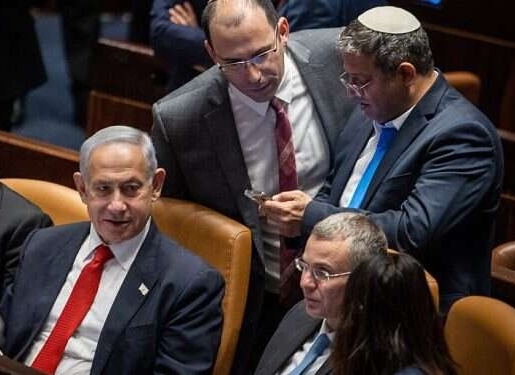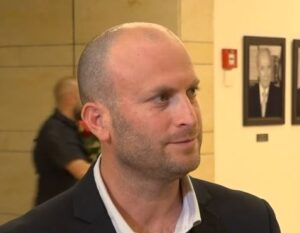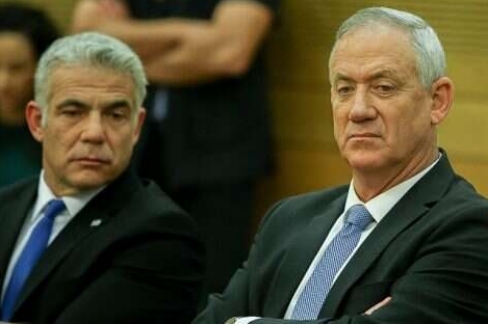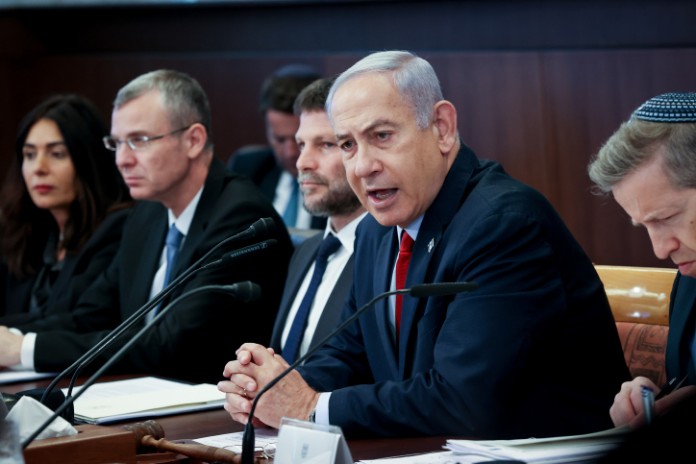It is not completely clear.
Last week was a difficult week in the Knesset with regard to the selection of Knesset representatives to the Judicial Selection Committee (the committee for selecting judges). It was so difficult that a good many savvy people were left scratching their heads.
Pictured below are some prominent members of the coalition with regard to this issue: Prime Minister Binyamin Netanyahu, Justice Minister Yariv Levin (Likud) to his left, and MK Simcha Rothman (RZ) behind him, speaking with Itamar Ben Gvir (Otzma Yehudit):

You will find here an overview that describes the basic unfolding of events, which at some points seemed incomprehensible to many. (“Huh? He did that? Why??”) But I have opted not to focus unduly on the details, the drama, especially as there are varying interpretations of what was going on behind the scenes. Motivations are frequently unknowable. And political stratagems are often opaque.
What seems most important is to understand where we are now and what might happen going forward.
~~~~~~~~~~
Legislation for the restructuring of this committee has not been brought forward yet (more on this below) and so the Knesset is still playing by the old rules on this matter. The committee of nine includes two members from the Knesset. (This is in addition to the justice minister – who chairs the committee – and one other minister, the president of the court and two other Supreme Court justices, and two members of the Israel Bar Association, all of whom, I believe, have been selected).
Last Wednesday, the Knesset was to select – in secret ballot – the two Knesset members for the committee. Traditionally one Knesset member is from the coalition and one from the opposition, but this is not written in law.
There were two competing expectations as to what should happen with regard to the selection of those two Knesset members. Many members of the coalition – led by Justice Minister Yariv Levin – thought that both Knesset members on the committee should be drawn from their ranks. They saw the opposition as consistently uncooperative and not deserving of committee representation. (I heartily concur with this position.)
It goes without saying that the leaders of the opposition demanded that one of Knesset representatives be drawn from their ranks. The threats from opposition leaders Yair Lapid (Yesh Atid) and Benny Gantz (National Unity) included a warning that they would not return to the negotiating table at the president’s house if one of the Knesset representatives was not from the opposition. There were threats, as well, of increasing riots on the streets. This is always their trump card (in the spirit of democracy, of course).
Some members of the coalition preferred to see continued attempts to achieve compromise via those negotiations. This meant having one Knesset representative from the opposition.
~~~~~~~~~~
And this is where the craziness began. The opposition candidate was Energy Minister Karine Elharrar of Yesh Atid.

By agreement the coalition was supposed to put up someone from Ben Gvir’s Otzma Yehudit, and that was MK Yitzhak Kreuzer.

But then a number of other coalition members put up their candidacies (leading to a total of seven candidates). This complicated matters considerably. Netanyahu called for all coalition candidates other than Kreuzer to withdraw. All did so, with the exception of the loose cannon Likud MK Tali Gottliv.
What seems to have been Netanyahu’s preference at this point was to kick the can down the road. He wanted to see no final decision on Wednesday, with another vote called for in 30 days. He was eager to avoid enormous unrest in the streets, with all the negative PR that is incurred, and he saw negative repercussions within the coalition if his commitment to Ben Gvir was not honored. With Gottliv in the picture this was a potential problem.
Kreuzer was convinced to withdraw. Netanyahu’s instructions to his coalition, then, were to vote down both the coalition and the opposition candidates. (If there are only two candidates then members of the plenum vote “yes” or “no” with regard to each.) The “no” votes of the coalition, he anticipated, would override the “yes” votes of the opposition for Elharrar. And the coalition at the same time would prevent the election of Gottliv. Then there would be a revote in 30 days.
This, however, is not what happened. Gottliv was defeated. But when the votes were counted, it turned out that Elharrar had won a position on the committee. She had received 58 “yes” votes and 56 “no” votes. This was a stunner as it meant at least four coalition members had voted for her.
There has been a great deal of talk about the prime minister’s inability to maintain coalition discipline and it was said that he was looking very bad. Explanations for what happened abound but there is no clear answer as to what was going on. It may have been a mini-rebellion, but at least one analyst says that those in the coalition who voted for Ehlharrar were doing Netanyahu a favor (that is, by placating the opposition and making them less obstructionist).
~~~~~~~~~~
If all of this makes your head spin, or if you have read a slightly different recounting of events (there are different versions), do not be concerned.
Let us look forward. The only issue of remaining importance, I think, is whether Netanyahu can control his coalition and whether his reputation has suffered significantly (I am not sure at all that it has, as we will see going forward).
~~~~~~~~~~
We are in a situation now in which one Knesset representative to the committee has been selected, but a revote for the second one must take place in 30 days.
There was, however, new game-playing by the opposition at this point. Lapid (left below) and Gantz held a press conference Wednesday evening at which they announced that they would not participate in negotiations at the president’s house until the full judiciary selection committee was formed in 30 days. They charged Netanyahu with breaking commitments.

Netanyahu denied that he had broken any commitments. The opposition, he charged, had said they would not continue if their representative was not selected to sit on the selection committee. But Ehlharrar has been selected, and what is clear is that they are looking for excuses to delay working on compromise judicial reforms.
~~~~~~~~~~
On Friday, Justice Minister Yariv Levin declared:
“At the end of a difficult week, I am more determined than ever to continue and do everything to pass the necessary reform to fix the judicial system.”
There had been rumors that he might resign, and his continued determination is welcome news.
http://www.israelnationalnews.com/news/372891

~~~~~~~~~~
Then at the Cabinet meeting on Sunday (yesterday), Netanyahu announced that judicial reform will be advanced, possibly beginning as early as this week.
“What was proven last week was that Gantz and Lapid were playing a game. For three months, their representatives did not agree on the most minimal issues. Their goal was to draw out every amendment. This is why we will gather this week and begin practical steps in a measured and responsible manner.”
~~~~~~~~~~

If the coalition moves on this, it will be a great relief. For too long has the country been held up by that opposition game-playing. Their goal is to delay reform, not to facilitate compromise. That is why not one single concrete compromise has been announced after months of meeting.
~~~~~~~~~~
I note here very pertinent observations by Berale Crombie, who has organized demonstrations in support of judicial reform (emphasis added):
“Netanyahu has been striving to broker a compromise even at the cost of alienating his own supporters.
“Unfortunately, there isn’t a single opposition leader today with the capability to effectively confront the leftist anarchists and negotiate a compromise with Israel’s democratic majority. This level of leadership deficit hasn’t been seen for quite some time.”
https://www.israelnationalnews.com/news/371740
Should the nation be held up indefinitely by these clowns?
~~~~~~~~~~
The question now is which judicial reform legislation will be advanced.
Before meetings had begun at Herzog’s residence, ostensibly with the goal of reaching compromises on judicial reform, legislation had been prepared by the coalition with regard to reformulating the makeup of the judicial selection committee; this legislation was spearheaded by Levin and MK Simcha Rothman (RZ). It was prepared to the point of only requiring a final vote in the plenum to become law. At the time the coalition said that if compromise negotiations were not productive, they would bring this legislation forward for that final vote. But it never happened.
Now Netanyahu has said, “Everyone understands that the previous law regarding the Judicial Selection Committee will not be advanced.” There were no clear answers as to why not but the reason is obvious. He hopes to advance a “more moderate” version of a law for restructuring the selection committee – “more moderate” presumably meaning there would be less pushback from the opposition.
The question is when this new legislation would be brought to the plenum for a vote. How ready is it? If it is possible to do this in less than 30 days, it would render moot the current issue of selecting representatives to the committee and require a re-start.
The thought occurs that Netanyahu may have had this in mind when attempting to delay the selection process for 30 days.
~~~~~~~~~~
Other judicial reform legislation to be brought forward now would address two other issues:
One deals with “reasonability.” As matters stand, justices of the court can void a law or action advanced by the Knesset because it is deemed by them to be “unreasonable,” and not because it conflicts with any existing legislation or specifically Basic Law. This creates a very arbitrary restriction on the authority of the Knesset.
Another has to do with the power of legal advisors, including the attorney general. Rather than advising, they have been given the latitude to dictate, and this must change.
~~~~~~~~~~
I will be looking at judicial reform issues as matters move forward.
However, I wish to call urgent attention to the fact that there are other critical issues that call for our immediate scrutiny. We must never lose sight of the bigger picture.
The evolving informal agreement between Biden and Iran is dangerous and unconscionable. As it would release additional billions of dollars to Iran, it would put Israel at greater risk: facilitating increased funding to Iranian proxies such as Hezbollah.
There is much talk about the Israeli-US relationship, which many insist remains strong. I see Biden himself and the members of his administration as enemies of Israel. There have been reports, notably from Reuters, suggesting that this informal deal with Iran is being advanced to obstruct Israel’s ability to attack Iran.
One unnamed official was quoted as saying, “If [the] Iranians miscalculate, the potential for a strong Israeli response is something we want to avoid.”
https://www.jpost.com/middle-east/iran-news/article-746702
Beyond infuriating.
Netanyahu, for his part, has made it clear that Israel is not bound by any such agreement:
“Our first mission is to stop Iran from going nuclear…We oppose agreements…what’s called a ‘mini-deal’ does not serve our purpose…and we oppose that as well [as well as the JCPOA was opposed by Israel].
“Israel will do on its own whatever it needs to do to defend itself from Iranian aggression…”
~~~~~~~~~~
It’s being called a “mini-deal” here in Israel but apparently Biden does not wish to name this deal at all to avoid interference by Congress.
https://www.jpost.com/middle-east/iran-news/article-746707
~~~~~~~~~~
On a positive note, there is movement here in Israel regarding fast-tracking building in Judea & Samaria.
Said Binyamin Regional Council head Israel Ganz: “This is a historic decision that changes the treatment of the settlements in Judea and Samaria.” It helps to normalize it so that it is more akin to the process “in all of Israel.” It turns “construction in the settlements into something that is not news, but routine.”
https://www.jpost.com/israel-news/article-746718
Of course, this meets with American displeasure, as it interferes with “the two-state solution.” We must not, we cannot, allow American attitudes to affect our decisions or curtail our rights.
~~~~~~~~~~
© Arlene Kushner. This material is produced by independent journalist Arlene Kushner. Permission is granted for it to be reproduced only with proper attribution.
